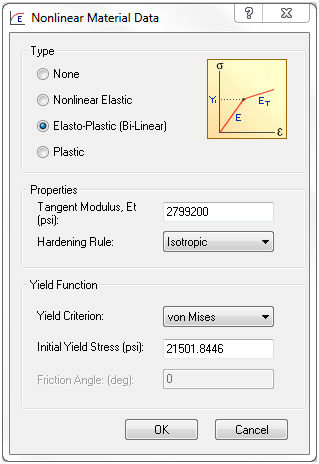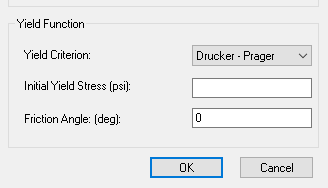On the Material form, under the Analysis Specific Data section, click the Nonlinear button. Then select the Elasto-Plastic (Bi-Linear) option under Type. The following window pops up:

- In this method, the plastic region can be defined by a
Plasticity Modulus (H). The plasticity modulus is in turn related to the
Tangent Modulus
 and
Young’s Modulus (E) as follows:
and
Young’s Modulus (E) as follows:

- The value of
Tangent Modulus
 is set to 10% of the Young’s Modulus as a default.
is set to 10% of the Young’s Modulus as a default.
- Thus the default values ensure a 10% slope for the linear plastic part of the material’s stress-strain curve.
- Autodesk Nastran calculates the stress values by linearly extrapolating outside the table and linearly interpolating inside the table based on the last two end points of the curve.
The following applies to both Elasto-Plastic and Plastic options.
- Three types of
Hardening Rules are available:
- Isotropic
- Kinematic
- Isotropic + Kinematic (Combined)
- Four types of
Yield Criterion are available. Various extra input data are required from you:
- von Mises: This is most widely used for ductile materials.
- Requires Initial Yield Stress value.
-
Tresca: Also applicable to ductile materials in general, but more conservative than von Mises.
- Also needs Initial Yield Stress value.
- Mohr-Coulomb: This theory is applicable to frictional materials like soil and concrete.
- Requires a 2*Cohesion value, in units of stress.
- Requires a Friction Angle value, 0<Φ<45 in degrees, default zero.
- Drucker-Prager: An approximation to the
Mohr-Coulomb theory, it is a modification to the
von Mises theory. Also applicable to frictional materials like soil and concrete.
- Requires a 2*Cohesion value, in units of stress.
- Requires a Friction Angle value, 0<Φ<45 in degrees, default zero.
- von Mises: This is most widely used for ductile materials.
- Initial Yield Stress: This value also has a default value which is extracted from the material library data for each selected material. It has other defaults if the material is not loaded from a library.
- Specific to Explicit analysis:

- Requires Initial Yield Stress value.
- Requires a Friction Angle value, in degrees, default zero.